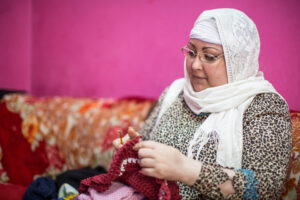Creating products and services that enable financial access for women entrepreneurs is a step towards achieving gender equality in the labor market. However, women, especially the low-income segment, are often overlooked by traditional financial service providers in Egypt. Women’s World Banking and Lead Foundation developed an innovative individual lending methodology that successfully reached women entrepreneurs. Should more financial service providers focus on serving women, there could be significant growth for the economy at large.
When her husband fell off an electrical pole and could no longer work, the future seemed dim for Sabah Adel Mahmoud and her family. With limited opportunity available, she decided to take a loan from the Lead Foundation and begin a poultry business.
Her business began with the hatching of 200 chicks. Today, however, there are over 1,000. In order to create an atmosphere that can accommodate so many birds, Sabah and her husband have built a large room with special heating conducive to the animals.
In the midst of the chaos of chicks running from left to right, her two young children play with chicks while occasionally pouring bird seed into bowls. Through their mother’s entrepreneurial success, both children have been able to attend school in recent years.
With only a few weeks before the intense feasting period of Ramadan set to begin, Sabah will soon see the fruits of her labor and investment pay off. With her expected profits, she will be able to pay back her loan and provide financial support her family. Eventually, she will return to Lead Foundation for another loan.
Lead Foundation is an Egyptian non-profit that provides financial services to segments of society that are most in need of economic empowerment: poor and low-income entrepreneurs, particularly women. Originally, Lead only offered group loans, but the amount of credit available was not enough for some of their clients to effectively establish and sustain businesses. Lead’s leadership team realized that what this group needed were individual loans designed to help them grow their business.
However, soon after the new individual lending product launched, a problem emerged. Their new product wasn’t reaching women clients. With the support of MetLife Foundation, Women’s World Banking came on board to help change the way Lead was looking at the challenge.
“Instead of hyper-focusing on the product, we took a wider view. From marketing, operational procedures to loan officer training, we looked at it all from a woman’s perspective,” said Sandy Salama, Lead’s Marketing and Communications Manager.
 Lead recognized the need to better communicate the proposition to prospective clients. They used customer segmentation research to reveal women clients’ unique profiles and tailor branding and marketing efforts to appeal to these segments.
Lead recognized the need to better communicate the proposition to prospective clients. They used customer segmentation research to reveal women clients’ unique profiles and tailor branding and marketing efforts to appeal to these segments.
Lead also increased gender diversity among their employees. They trained and hired more female loan officers to address cultural sensitivity around men interacting with women to increase outreach to low-income women, women like Manal Sayed Ahmad.
Having to a female loan coordinator explain the individual loan made all the difference to the Cairo-based crochet designer. Manal felt free and comfortable to welcome her into her home and speak with her. “I thought it sounded great,” she said about the loan. Manal hopes to continue to grow her business and eventually hire employees to help her. To do this, she will keep relying on Lead, an ally she would not have made had her loan coordinator been a man.
In two years, these transformative efforts to reach low-income women have been successful for Lead. The number of women clients in individual lending grew from 20 percent in 2014 to over 50 percent by the end of 2017. This increase of women clients almost doubled their entire individual loan portfolio.
Although Lead is a non-profit, their success signals that reaching low-income women with financial products has the potential to be profitable for traditional financial service providers in Egypt.
In fact, should more financial service providers focus on serving women, there could be significant growth for the economy at large.
Creating products and services that enable financial access for women entrepreneurs is a step towards achieving gender equality in the labor market. Parity in Egypt’s labor market could boost GDP by as much as 32 percent according to a recent report by the IFC.
However, the country has much further to go. While Egypt’s overall financial inclusion numbers have grown dramatically in recent years, data from the most recent Findex report shows that the gender gap has doubled. Between 2011 and 2017, men’s financial inclusion increased from 13 percent to 39 percent while women’s financial inclusion only grew from 6 percent to 29 percent. Women’s World Banking will continue to work with Lead and other institutions focused on the women’s market to bring prosperity for Egypt’s women entrepreneurs, women like Sabah and Manal, their families and communities.



